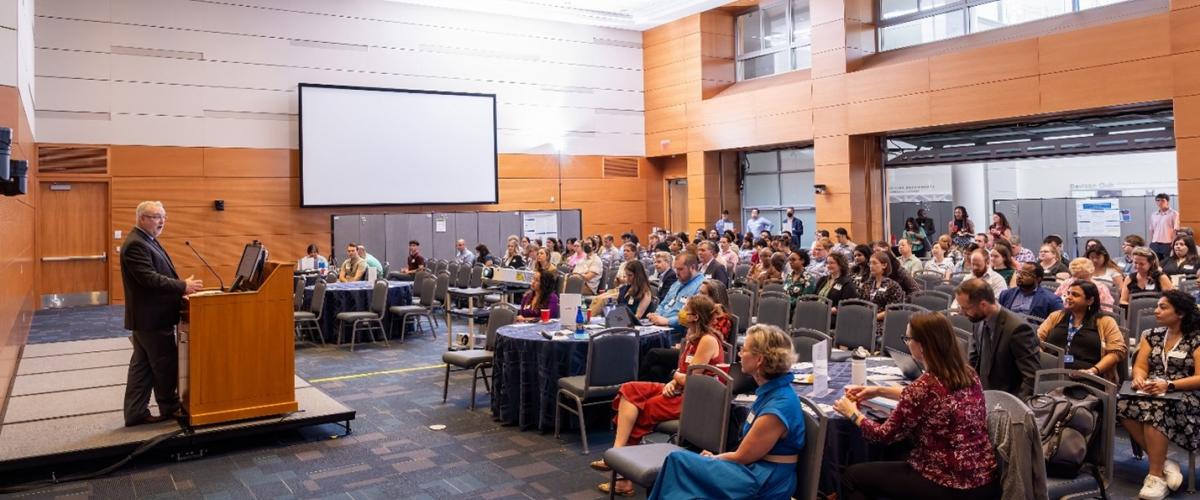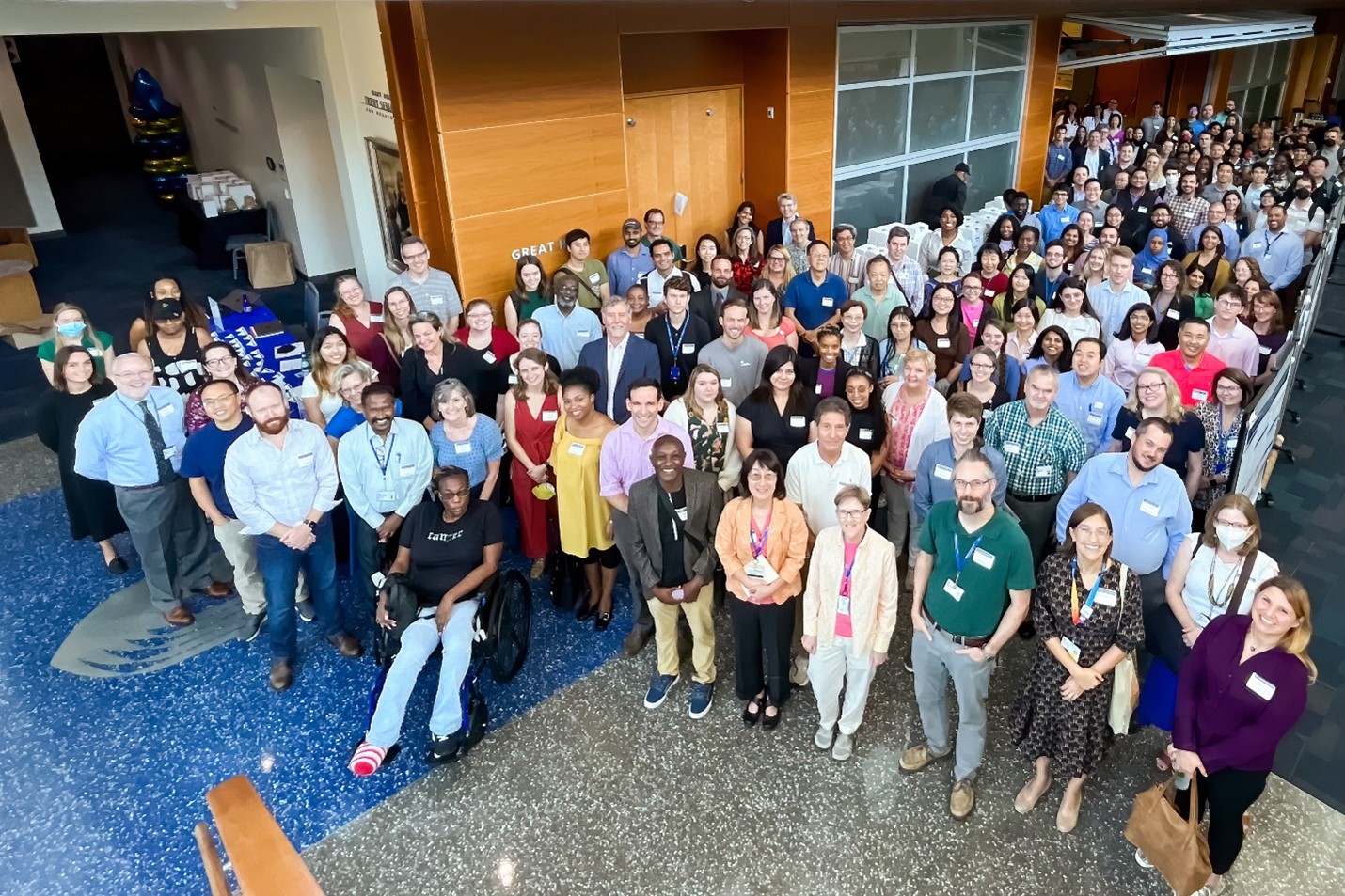
Thank you to everyone who joined us for the 19th Annual CFAR Fall Scientific Retreat, held on Thursday, September 14th. We had over 200 attendees, bringing together CFAR researchers from across campus and community members from the Duke Collaborative Community Council (D3C) to share in a packed day full of scientific updates and connecting in our common cause.
View our photo album for snapshots of the event, taken by John Hansen and Lindsay Soo of RTP.Studio. Recordings from the day will be made available soon on the CFAR website.

The day started off with a welcome from Michael Relf, Chair of the Conference Organizing Committee, and CFAR Director Georgia Tomaras. Dr. Tomaras shared highlights and successes from the Duke CFAR over the past year, including new CFAR Supplement Awards:
National Institute of Health- Ending the HIV Epidemic in the US Initiative
- Evaluating the use of long-acting antiretroviral treatment for HIV during community re-entry: Addressing community and structural barriers - Lauren Brinkley-Rubinstein, PhD
- Leveraging Southern Community-Based Pharmacies for PrEP Referrals - Charles Burns, MD
Center for AIDS Research – Administrative Supplements
CDEIPI - CFAR Diversity, Equity, and Inclusion Pathway Initiative
- Evidence2Practice (E2P): Leveraging Implementation Science to Promote Careers in HIV Research among Historically Black College and University (HBCU) Students, Phase III - Lance Okeke, MD and Amy Corneli, PhD
Community-led research
- Community-Driven Implementation of Stigma Interventions in African American Faith Communities - Sarah Wilson, PhD and Eugenia Rogers

Dr. LaTonya Williams awarded 2023 Duke HIV/AIDS IRTPA T32 Outstanding Leadership in Scientific Mentoring Award
In partnership with the Duke School of Medicine and the Duke CFAR, the long-standing NIH T32 Duke Interdisciplinary Research Training Program in AIDS (IRTPA) acknowledges early career Duke faculty members who demonstrate leadership in the education and scientific mentoring of the next generation of scientists with a focus on interdisciplinary training and broadening participation in the biomedical workforce.
Program Co-Directors Nathan Thielman and Guido Ferrari presented this year's Outstanding Leadership in Scientific Mentoring Award to LaTonya Williams, Director of Preclinical Translation within the Duke Center for Human Systems Immunology (CHSI) Laboratory. The IRTPA team shared several quotes from others as part of the nomination process which exemplify Dr. Williams's commitment to mentorship and support of trainees:
"Dr. Williams helped me to hone scientific reading and writing skills, experimental design skills, presentation skills and leadership skills. She is very attentive to the needs of the individuals on her team and supported us on our efforts to pursue our goals we had set for the next step in our career. She easily adjusted to the mentoring style each of her team members preferred and so avoided a one-size-fits-all approach."
"Dr. Williams’ commitment to her team and her work embody Duke’s core standards of leadership, respect, and professionalism. [She] inspires me, as well as my fellow lab members, every day through her dedication not only to her work and the field of science, but to the success of her team members."
Congratulations, Dr. Williams!

Centering the conversation on equity, social determinants of health, and human rights
The morning session started off with two presentations focusing on equity, social determinants of health, and human rights issues in HIV and research. New faculty member Lauren Brinkley-Rubinstein discussed HIV and the Criminal Legal System, highlighting the need to support individuals in their HIV prevention and care needs, particularly during reentry into the community after time spent in the carceral system. Rosa Gonzalez-Guarda presented on The Syndemics of HIV, Substance Use, Interpersonal Violence, and Mental Health, sharing her work on how to build resilience to acculturative stress within Latino immigrant communities. The presentations also led to lively engagement with the audience, including members of the D3C.

CFAR Developmental Core invests in Early-Stage Investigators
The morning session wrapped up with three presentations from investigators supported by the CFAR Developmental Core. Charlie Burns, a recipient of faculty development, pilot, microgrant, and CFAR supplemental awards, discussed an integrated approach to overcoming re-engagement obstacles in his presentation Building a Re-Engagement Network for Out of Care Persons with HIV at Duke and Beyond. Marina Tuyishime shared findings from her work funded by a CFAR Pilot Award in her presentation, Evaluation of KSHV-specific Antibody Functions in People Living with HIV. Ahmad Mourad reflected on Conducting Research During an Outbreak - What Can We Learn from Mpox? He shared his experience engaging an entire class of first-year adult Infectious Disease fellows in research about mpox and sexually transmitted infection testing, funded through a targeted CFAR grant mechanism created in response to the emerging mpox outbreak.

Poster presenters showcase CFAR Research
In the afternoon, attendees also had the opportunity to meet with poster presenters showcasing the breadth of research across the Duke CFAR. This year, presenters were also asked to create a plain-language infographic geared towards a general audience to complement their scientific poster. Congratulations to the winners of this year's best poster awards!


The Duke Collaborative Community Council (D3C) amplifies the voices of community
The D3C is a group of community members in Durham and across North Carolina who care about breaking down the stigma around HIV and promoting HIV prevention & care in our communities. The D3C partners with the Duke CFAR by providing input on HIV-related research that is happening at Duke and planning outreach events to connect to the broader community. They offer consultations to CFAR teams to give feedback on grant proposal development or activities related to implementation of research projects. To request a consultation, please contact Lizzy Knippler at elizabeth.knippler@duke.edu
The D3C is led by its chair Eugenia Rogers, who delivered heartfelt prerecorded remarks sharing some of her family's experiences with the health system in Durham and underscoring the important work clinicians and researchers must do to repair trust and extend compassion. Eugenia's words were a call to action to all of us to "be better" than our predecessors, do more to get to know people, understand the history and trauma of the Black community and communities affected by HIV, and to remember who is at the heart of all the research we do: "Our blood fuels the research. Please don't forget about us."

Early career investigators shine in afternoon presentations
The afternoon featured oral presentations from pre- and post-doctoral trainees and junior faculty, selected from submitted abstracts:
Induction of CD4-mimicking Broadly-Neutralizing Antibody Precursors in Rhesus Macaques Using Germline-Targeting Immunogens - James Counts, Post-Doctoral Fellow, Duke Human Vaccine Institute
Association of Perceived, Anticipated, and Experienced Stigma with Types of HIV Status Self-disclosure among Adolescents and Young Adult Women (18-24 years old) in Rwanda and Tanzania - Maryam Al-Mujtaba, PhD Student, Duke University School of Nursing

Single cell transcriptomic differential expression analysis of HIV broadly neutralizing B cells in Humans - Mohammad Samsul Alam, PhD Candidate, Department of Statistics,
The Nasopharyngeal Microbiome is altered in Botswana Children Living with HIV - Sweta Patel, Assistant Professor of Medicine, Duke University
Host Immunity to a Pathogenic SHIV in Young versus Adult Rhesus Macaques - Sommer Holmes, Research Technician II, Duke Human Vaccine Institute

Bringing home the importance of collaboration
The day closed out with some inspirational words from the recently appointed Provost Alec Gallimore. Though Provost Gallimore's previous work was in pursuit of sending individuals to Mars, he drew parallels to our work at the CFAR and the complexity of the issues we are trying to address through our efforts that cannot be solved by one person or one field. He emphasized the importance of collaboration to make progress and implement change in care, and challenged us to strive to always bring joy to our work. CFAR Co-Director Susanna Naggie gave final closing remarks reiterating the multidisciplinary strengths of the Duke CFAR and the many examples of mentorship and excellence on display throughout the day - "The future is bright!"

